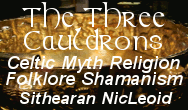Pagan Paths
Explore the way that the Christian Myth and the ‘Path of the Wise’ intertwine into a path of wisdom and action in the worlds.
Dissidence
Earlier this year, I decided to go back to school to complete a Master’s in Bioethics (I know, as if raising two young kids, working full-time while trying to get another book out and juggling 2 blogs wasn’t enough. What can I say? I am mildly insane!) I am taking a class right now in Bioethics and the law, which is really interesting. We are reading a book by Guy Durand (Six études d’éthique et de philosophie du droit) and the last chapter was on Dissidence and social disobedience. His commentary was that there is a place for disobedience to authority within certain boundaries and that we have a right to refuse to do something that is contrary to our conscience, even if it is mandated by the law. An example of this is the refusal to military service if it is against your personal convictions. In certain countries, this objection of conscience is a recognized right and accommodations can be made (such as civil service instead of military service, for instance)
The reason I am bringing this up is that the author wrote an overview of the history of civil disobedience and he noted that it was part of the Judeo-Christian tradition. I always saw Jesus as a revolutionary, someone who opposed archaic laws for the good of the people. It was surprising to see this reflection in a book of legal bioethics. Especially in Quebec, where most of religious references have been tossed aside during the Quiet Revolution.
Guy Durand gives the example of Exodus 2, 15-21 where midwives refused to kill Jewish male newborns at the command of the pharaoh.
He quotes the following scripture as examples of Jesus’ opposition to the ‘Establishment’:
Healing on the Sabbath (Mark 3, 1-6)
Harvesting grain on the Sabbath (Mark 2, 23-28)
Driving out of the Temple changers (Mark 11, 15-19)
Fraternizing with unclean people (Mark 2, 15-17)
Talking with a Samaritan woman (John 4, 5-9)
Jesus’ answer: ‘The Sabbath is made for man, not man for the Sabbath.’ (Mark 2, 27)
This means that we have a divine conscience that allows us to make decisions and distinguish right from wrong. That is the warrior path of Christianity: to follow your conscience for the greater good of humankind, in the defense of those who need protection, for the exaltation of spirit. This is also something I reconnected with when I started being involved with Paganism. The Pagan community still has the activist spirit, often standing up for environmental causes, gay rights and social equality. It is an integral part of Pagan spirituality, much the way it used to be the basis for the emerging Christian movement at its very beginning. It is a good reminder of what Christianity used to stand for.
Comments
-
Please login first in order for you to submit comments



















